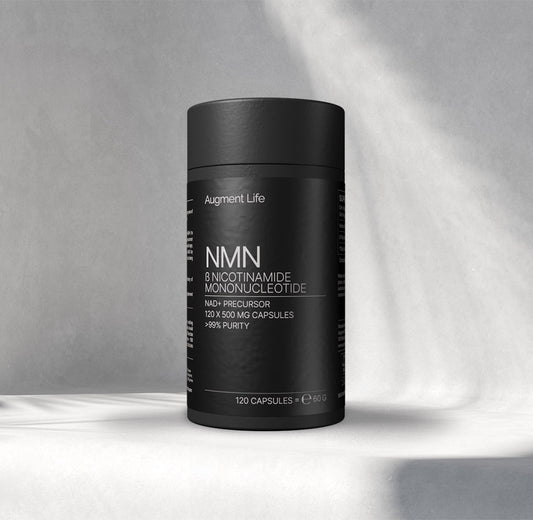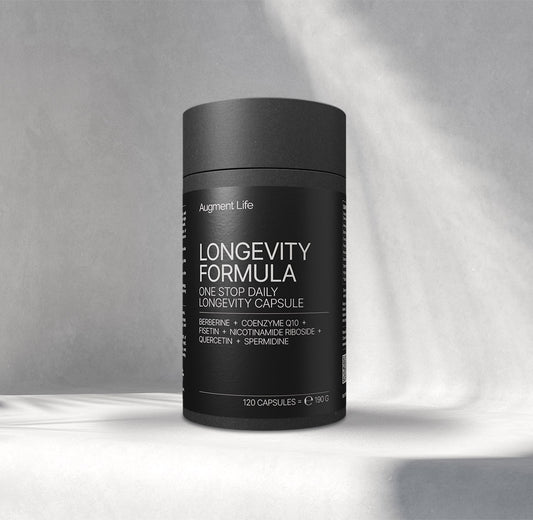Τα τελευταία χρόνια έχει παρατηρηθεί μια από τις μεγαλύτερες τάσεις στον τομέα της υγείας και της μακροζωίας, που είναι τα συμπληρώματα κολλαγόνου. Το κολλαγόνο γίνεται όλο και πιο δημοφιλές για την καταπολέμηση των ρυτίδων, την υγεία των αρθρώσεων, τη σύσφιξη του δέρματος και τη δημιουργία μιας νεανικής λάμψης. Όταν πρόκειται για την έρευνα των διαφορετικών τύπων κολλαγόνου, ένα από τα πρώτα ερωτήματα που όλοι τείνουν να θέτουν είναι: Θαλάσσιο κολλαγόνο vs. κολλαγόνου βοοειδών – Ποιο είναι καλύτερο;
Σε αυτό το άρθρο θα συζητήσουμε και θα συγκρίνουμε και τις δύο μορφές, λαμβάνοντας υπόψη την επιστημονική έρευνα, για να δούμε πότε είναι προτιμότερο να χρησιμοποιείται η κάθε μία.
Τι είναι το κολλαγόνο και γιατί είναι σημαντικό;
Το κολλαγόνο είναι η πιο άφθονη πρωτεΐνη στον οργανισμό και αποτελεί βασικό συστατικό όλων των συνδετικών ιστών, όπως το δέρμα, τα οστά και οι τένοντες (1). Με την πάροδο της ηλικίας, η παραγωγή κολλαγόνου μειώνεται, με αποτέλεσμα την εμφάνιση σημείων όπως ρυτίδες στο δέρμα, πόνοι στις αρθρώσεις και απώλεια ελαστικότητας των ιστών (2). Για τον λόγο αυτό, η συμπλήρωση κολλαγόνου —ιδιαίτερα μετά την ηλικία των 30 ετών— έχει καταστεί απαραίτητο μέρος της υγιούς γήρανσης.
Μέχρι στιγμής έχουν περιγραφεί 28 τύποι κολλαγόνου, εκ των οποίων οι τύποι Ι, ΙΙ και ΙΙΙ είναι οι πιο διαδεδομένοι στον άνθρωπο.
-
Type I: Found in skin, bones, hair, etc.
-
Type II: Essential for cartilage tissue and directly related to joint health.
-
Type III: Often found alongside Type I in skin, as well as in intestines, surrounding tissues of organs, and muscle connective tissue. It supports skin elasticity and works synergistically with Type I.
Έχουμε επίσης ένα αναλυτικό άρθρο στο οποίο εξηγούμε τις λειτουργίες του κολλαγόνου στον οργανισμό, τα προβλήματα υγείας που μπορεί να προκύψουν από την έλλειψή του και τους σωστούς τρόπους χρήσης του. Αν σας ενδιαφέρει, μπορείτε να διαβάσετε το άρθρο αυτό εδώ.
Θαλάσσιο κολλαγόνο: Φιλικό προς το δέρμα
Το θαλάσσιο κολλαγόνο προέρχεται από το δέρμα, τα οστά και τα λέπια των ψαριών κρύου νερού. Περιέχει κυρίως κολλαγόνο τύπου Ι, το οποίο το καθιστά ιδανικό για την υγεία του δέρματος, των μαλλιών και των νυχιών (3).
Πλεονεκτήματα του θαλάσσιου κολλαγόνου
-
Εξαιρετική βιοδιαθεσιμότητα: Αυτή η δομή θεωρείται ότι απορροφάται πιο εύκολα από τον οργανισμό (3).
-
Οφέλη για την υγεία του δέρματος: Πιστεύεται ότι τα πεπτίδια θαλάσσιου κολλαγόνου μπορεί να έχουν θετική επίδραση στην παραγωγή υαλουρονικού οξέος, το οποίο βοηθά το δέρμα να διατηρεί την υγρασία του, προάγοντας την ελαστικότητα και τη νεανική εμφάνιση.
Μια κλινική μελέτη διαπίστωσε ότι γυναίκες ηλικίας 45-60 ετών που χρησιμοποίησαν υδρολυμένο θαλάσσιο κολλαγόνο για 12 εβδομάδες παρουσίασαν μείωση των ρυτίδων κατά 35%, αύξηση της ελαστικότητας του δέρματος κατά 10-20% και βελτίωση της συνολικής εμφάνισης του δέρματος κατά 9-25% (4).
-
Κατάλληλο για διατροφικούς περιορισμούς: Το θαλάσσιο κολλαγόνο είναι κατάλληλο για άτομα που δεν τρώνε βοδινό ή χοιρινό κρέας.
-
Βιωσιμότητα: Περίπου το 75% του βάρους των ψαριών μετατρέπεται σε υποπροϊόντα επεξεργασίας, τα οποία μπορούν να επαναχρησιμοποιηθούν ως κολλαγόνο, μια πιο βιώσιμη χρήση υλικών που διαφορετικά θα πήγαιναν χαμένα. Η χρήση τμημάτων πλούσιων σε κολλαγόνο, όπως το δέρμα, τα οστά και τα λέπια, είναι φιλική προς το περιβάλλον και βιώσιμη (5).
Μειονεκτήματα του θαλάσσιου κολλαγόνου
-
Κόστος: Γενικά είναι πιο ακριβό από το βοοειδές κολλαγόνο.
-
Περιορισμένες εφαρμογές: Τα οφέλη του περιορίζονται κυρίως σε δερματικές και καλλυντικές χρήσεις. Η ενίσχυση των αρθρώσεων ή του εντέρου δεν είναι τόσο ισχυρή όσο με το βοοειδές κολλαγόνο.
-
Γεύση και οσμή: Ορισμένοι χρήστες ενδέχεται να παρατηρήσουν μια ελαφριά γεύση ή οσμή από θαλασσινά.
Κολλαγόνο βοοειδών: Υποστήριξη για τις αρθρώσεις και το σώμα
Το κολλαγόνο βοβοειδών προέρχεται από το δέρμα, τα οστά και τους τένοντες των αγελάδων. Περιέχει κολλαγόνο τύπου Ι και τύπου ΙΙΙ και συμβάλλει στην υγεία του δέρματος, των αρθρώσεων και των συνδετικών ιστών (1).
Πλεονεκτήματα του βοείου κολλαγόνου
-
Υγεία του δέρματος: Τα κολλαγόνα τύπου Ι και ΙΙΙ αυξάνουν την ελαστικότητα και την υγρασία του δέρματος. Μελέτες έχουν δείξει ότι τα άτομα που χρησιμοποιούν πεπτίδια βοείου κολλαγόνου παρουσίασαν αύξηση της ενυδάτωσης του δέρματος κατά 27% και μείωση του βάθους των ρυτίδων κατά 60% (6).
-
Υγεία των αρθρώσεων: Το βοοειδές κολλαγόνο είναι πλούσιο σε γλυκίνη, προλίνη και υδροξυπρολίνη. Αυτά τα αμινοξέα είναι ζωτικής σημασίας για την αποκατάσταση του χόνδρου και τη μείωση του πόνου στις αρθρώσεις.
Σε μια κλινική μελέτη στην οποία συμμετείχαν 274 ασθενείς με ρευματοειδή αρθρίτιδα, όσοι έλαβαν χαμηλή δόση κολλαγόνου τύπου II από το στόμα (20 µg/ημέρα) παρουσίασαν βελτίωση στον πόνο και τη λειτουργία των αρθρώσεων, χωρίς να αναφερθούν παρενέργειες (7).
-
Υγεία του εντέρου: Η γλυκίνη υποστηρίζει την ακεραιότητα του εντερικού τοιχώματος και μπορεί να βοηθήσει στην πρόληψη παθήσεων όπως το «διαρρέον έντερο» (1).
-
Κόστος: Γενικά πιο οικονομικό σε σύγκριση με το θαλάσσιο κολλαγόνο.
Μειονεκτήματα του βοείου κολλαγόνου
-
Βιοδιαθεσιμότητα: Σε σύγκριση με το θαλάσσιο κολλαγόνο, το μέγεθος των μορίων του μπορεί να είναι ελαφρώς μεγαλύτερο, γεγονός που μπορεί να οδηγήσει σε βραδύτερη απορρόφηση.
-
Ηθικά και θρησκευτικά ζητήματα: Δεν είναι κατάλληλο για χορτοφάγους, vegan ή άτομα που αποφεύγουν το βόειο κρέας για θρησκευτικούς λόγους.
-
Ανησυχίες σχετικά με ασθένειες ζωικής προέλευσης: Αν και οι σύγχρονες διαδικασίες παραγωγής είναι γενικά ασφαλείς, ορισμένοι άνθρωποι μπορεί να είναι επιφυλακτικοί λόγω της ζωικής προέλευσής τους.
Ποιο να επιλέξετε σε διαφορετικές καταστάσεις;
-
Εάν η υγεία του δέρματος είναι η προτεραιότητα: Το θαλάσσιο κολλαγόνο ξεχωρίζει. Η μικρότερη πεπτιδική του δομή μπορεί να συμβάλει πιο γρήγορα στη βελτίωση της ελαστικότητας και της ενυδάτωσης του
-
Εάν η υγεία των αρθρώσεων και του εντέρου είναι προτεραιότητα: Το βοοειδές κολλαγόνο είναι πιο ευεργετικό επειδή περιέχει τον τύπο Ι (για το δέρμα) και τον τύπο ΙΙΙ (που υποστηρίζει τους συνδετικούς ιστούς), ενώ ο τύπος ΙΙ (που συνήθως βρίσκεται σε συγκεκριμένα συμπληρώματα για τις αρθρώσεις) είναι ειδικά για την υγεία του χόνδρου.
-
Εάν υπάρχουν ευαισθησίες: Το θαλάσσιο κολλαγόνο είναι πιο κατάλληλο για όσους αποφεύγουν τα προϊόντα από βοδινό κρέας.
Η βιοδιαθεσιμότητα κάνει πραγματικά τη διαφορά;
Πολλοί καταναλωτές ρωτούν: «Το θαλάσσιο κολλαγόνο απορροφάται πραγματικά καλύτερα;»
Οι έρευνες δείχνουν ότι τα πεπτίδια θαλάσσιου κολλαγόνου έχουν μικρότερο μοριακό μέγεθος, γεγονός που μπορεί να επιτρέπει ταχύτερη απορρόφηση κατά τη διάρκεια της πέψης. Ωστόσο, ορισμένοι επιστήμονες επισημαίνουν ότι αυτή η διαφορά δεν δημιουργεί σημαντικό πλεονέκτημα στην καθημερινή χρήση. Με άλλα λόγια, και οι δύο τύποι κολλαγόνου μπορούν να προσφέρουν παρόμοια οφέλη όταν χρησιμοποιούνται τακτικά (1, 3).
Δεδομένου ότι το κολλαγόνο υπάρχει φυσικά ως μακριές και μεγάλες πρωτεϊνικές ίνες, είναι δύσκολο για τον οργανισμό να το αφομοιώσει και να το απορροφήσει. Το υδρολυμένο κολλαγόνο, ή πεπτίδια κολλαγόνου, διασπάται σε μικρότερα θραύσματα από ένζυμα, επιτρέποντάς τους να απορροφηθούν εύκολα μέσω των εντέρων και να εισέλθουν στην κυκλοφορία του αίματος.
Έρευνες δείχνουν ότι η κατανάλωση υδρολυμένου κολλαγόνου μπορεί να αυξήσει την ενυδάτωση και την ελαστικότητα του δέρματος, καθώς και να υποστηρίξει την υγεία των αρθρώσεων και του συνδετικού ιστού (8).
Με βάση αυτή την επιστημονική βάση, τα πεπτίδια κολλαγόνου Augment Life περιέχουν πρωτεΐνες και απαραίτητα αμινοξέα με υψηλή βιοδιαθεσιμότητα και εύκολη απορρόφηση, βελτιστοποιώντας έτσι τη φυσική παραγωγή κολλαγόνου του οργανισμού και υποστηρίζοντας την υγεία του δέρματος, των μαλλιών και των αρθρώσεων.
Δείτε αυτή τη σκόνη κολλαγόνου που διατίθεται στο Augment Life Shop:
Type II Collagen Peptides – Powder
Conclusion: Which Should You Choose?
Δεν υπάρχει σαφής «νικητής» μεταξύ του θαλάσσιου κολλαγόνου και του βοείου κολλαγόνου. Η επιλογή εξαρτάται εξ ολοκλήρου από τις προσωπικές προτεραιότητες και τους στόχους υγείας.
-
Για νεανική επιδερμίδα → Θαλάσσιο κολλαγόνο ή βοοειδές κολλαγόνο (τύπου I + III)
-
Για ισχυρότερες αρθρώσεις και υγεία του εντέρου → Βοοειδές κολλαγόνο
Να θυμάστε: Η συμπλήρωση κολλαγόνου δεν είναι θαύμα. Τα καλύτερα αποτελέσματα επιτυγχάνονται όταν συνδυάζεται με μια ισορροπημένη διατροφή, επαρκή ενυδάτωση, τακτική άσκηση και υγιεινές συνήθειες ζωής.











